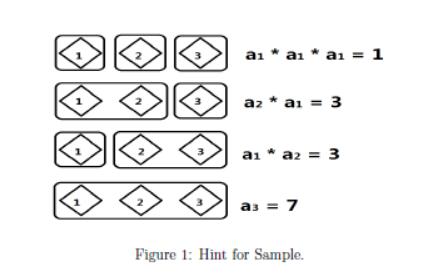HDU Shell Necklace CDQ分治+FFT
Shell Necklace
Problem Description
Perhaps the sea‘s definition of a shell is the pearl. However, in my view, a shell necklace with n beautiful shells contains the most sincere feeling for my best lover Arrietty, but even that is not enough.
Suppose the shell necklace is a sequence of shells (not a chain end to end). Considering i continuous shells in the shell necklace, I know that there exist different schemes to decorate the i shells together with one declaration of love.
I want to decorate all the shells with some declarations of love and decorate each shell just one time. As a problem, I want to know the total number of schemes.
Suppose the shell necklace is a sequence of shells (not a chain end to end). Considering i continuous shells in the shell necklace, I know that there exist different schemes to decorate the i shells together with one declaration of love.
I want to decorate all the shells with some declarations of love and decorate each shell just one time. As a problem, I want to know the total number of schemes.
Input
There are multiple test cases(no more than 20 cases and no more than 1 in extreme case), ended by 0.
For each test cases, the first line contains an integer n, meaning the number of shells in this shell necklace, where 1≤n≤105. Following line is a sequence with nnon-negative integer a1,a2,…,an, and ai≤107 meaning the number of schemes to decorate i continuous shells together with a declaration of love.
For each test cases, the first line contains an integer n, meaning the number of shells in this shell necklace, where 1≤n≤105. Following line is a sequence with nnon-negative integer a1,a2,…,an, and ai≤107 meaning the number of schemes to decorate i continuous shells together with a declaration of love.
Output
For each test case, print one line containing the total number of schemes module 313(Three hundred and thirteen implies the march 13th, a special and purposeful day).
Sample Input
3
1 3 7
4
2 2 2 2
0
Sample Output
14
54

Hint

For the first test case in Sample Input, the Figure 1 provides all schemes about it. The total number of schemes is 1 + 3 + 3 + 7 = 14.
题解:
f[i] = ∑ f[ n - i ] * a[i]
分治FFT经典题,不作赘述
#include<bits/stdc++.h> using namespace std; #pragma comment(linker, "/STACK:102400000,102400000") #define ls i<<1 #define rs ls | 1 #define mid ((ll+rr)>>1) #define pii pair<int,int> #define MP make_pair typedef long long LL; const long long INF = 1e18+1LL; const double pi = acos(-1.0); const int N = 3e5+10, M = 1e3+20,inf = 2e9; const LL mod = 313LL; struct Complex { double r , i ; Complex () {} Complex ( double r , double i ) : r ( r ) , i ( i ) {} Complex operator + ( const Complex& t ) const { return Complex ( r + t.r , i + t.i ) ; } Complex operator - ( const Complex& t ) const { return Complex ( r - t.r , i - t.i ) ; } Complex operator * ( const Complex& t ) const { return Complex ( r * t.r - i * t.i , r * t.i + i * t.r ) ; } } ; void FFT ( Complex y[] , int n , int rev ) { for ( int i = 1 , j , t , k ; i < n ; ++ i ) { for ( j = 0 , t = i , k = n >> 1 ; k ; k >>= 1 , t >>= 1 ) j = j << 1 | t & 1 ; if ( i < j ) swap ( y[i] , y[j] ) ; } for ( int s = 2 , ds = 1 ; s <= n ; ds = s , s <<= 1 ) { Complex wn = Complex ( cos ( rev * 2 * pi / s ) , sin ( rev * 2 * pi / s ) ) , w ( 1 , 0 ) , t ; for ( int k = 0 ; k < ds ; ++ k , w = w * wn ) { for ( int i = k ; i < n ; i += s ) { y[i + ds] = y[i] - ( t = w * y[i + ds] ) ; y[i] = y[i] + t ; } } } if ( rev == -1 ) for ( int i = 0 ; i < n ; ++ i ) y[i].r /= n ; } Complex y[N],s[N]; LL dp[N],a[N]; int n; void cdq(int ll,int rr) { if(ll == rr) { dp[ll] += a[ll]; dp[ll] %= mod; return ; } cdq(ll,mid); int len = 1; while(len <= (rr-ll+2)) len<<=1; for(int i = 0; i < len ; ++i) y[i] = Complex(0,0),s[i] = y[i]; for(int i = 0; i < len; ++i) y[i] = Complex(a[i+1],0); for(int i = ll; i <= mid; ++i) s[i - ll] = Complex(dp[i],0); FFT(s,len,1);FFT(y,len,1); for(int i = 0; i < len; ++i) s[i] = y[i] * s[i]; FFT(s,len,-1); for(int i = mid; i < rr; ++i) dp[i+1] += LL(s[i-ll].r+0.5),dp[i] %= mod; cdq(mid+1,rr); } int main() { while(scanf("%d",&n)!=EOF) { if(!n) return 0; memset(a,0,sizeof(a)); for(int i = 1; i <= n; ++i) scanf("%lld",&a[i]),dp[i] = 0,a[i] = a[i] % mod; cdq(1,n); printf("%lld\n",dp[n]); } return 0; }


